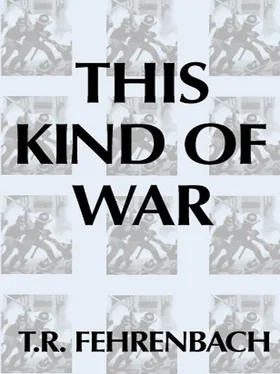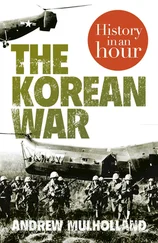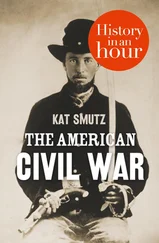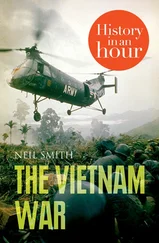For, unassuming, unaggressive, with no desire whatever to kill the man they called Joe Chink, when backed into a corner, or assaulted on their hills, these men showed that the spirit of the Alamo was not dead.
They had had the benefit of what had gone before. They came to Korea knowing in some measure what it would be like. The word was out. Like Frank Muñoz, when offered George Company, they wouldn't volunteer—but what had to be done they would do.
If the job was pointed out to Americans, and they understood it had to be done, with no escape; if they were trained to do it, as they were from 1951 onward, Americans could do what had to be done.
If another war follows Korea, if American policy is threatened anywhere on the globe, it will not be years and months, as in the two world wars, or days, as in Korea, but only hours until American troops are committed.
In battle, Americans learn fast—those who survive.
The pity is, their society seems determined to make them wait until the shooting starts.
The word should go out sooner.
In May of 1952, a treaty of peace was signed between the United States and Japan. The Army ceased to occupy, and now became honored guests of the shrunken Empire of Japan.
Very little changed, except that now the Japanese were free to criticize their best customers, if they dared.
In Japan, the Korean War was always close, but always far away. While the Korean people were inevitably the real losers of the war, the Japanese became the true winners. The Korean War poured billions of American dollars into the Japanese economy.
Millions of Americans passed through Japan, moving to and from the combat zones. These had money in amounts unbelievable to the Nipponese—and the Japanese, among the world's most industrious people, soon found Americans would spend it for almost anything, if given the opportunity.
The Japanese, who view the nude human body with the same aplomb they view the naked dawn, soon found nudity was highly marketable. Farm areas were scoured for girls whose bosoms measured up to Western standards, to walk about in clubs without clothes. Some Americans, understandably, when buying tobacco from the strolling cigarette girl, picked up the wrong brands.
There were other business ventures. One young chaplain from a tank battalion, a Methodist with a family back home, was accosted by procurers fourteen times in 1952 while walking from his Tokyo hotel to a cab.
All Americans, passing through, found that good Canadian whiskey was $1.50 a fifth, and drinks a quarter U.S. a throw. As one officer said, happily, "At these prices I can't afford to stay sober!"
These things were inevitable in war. Men going to and from a battlefield, even in crusades, have usually sought the same things. The Japanese could not be blamed for turning their nation into a large red-light district, for what the customer with money wants, he always gets.
The big money, and the prosperity that flushed the Japanese economy, however, came from American arms expenditures. American military procurement officers found Japanese industry—far more capable and efficient than it is generally given credit for—could produce almost anything needed at the front—and much cheaper than it could be made in the States and sent across the Pacific.
Thousands of American military vehicles, damaged or worn out in Korea, were rebuilt in Japanese shops, some as many as three times, far more cheaply than they could have been replaced. The Japanese, under contract, could manufacture ammunition, tools, equipment, almost anything. They could produce millions of tons of food for Koreans and Americans in FECOM. All in all, the Japanese economy hummed. They made big money.
The benefits did not all accrue to the Japanese, however.
Without its solid industrial base in Japan, in privileged sanctuary from the battles, the United States would have found it as difficult to fight the Korean War as it would have been to land on Normandy on D-Day, had Britain not been there.
| Go to Table of Contents |
38
The Last Spring
… All of the heroism and all of the sacrifice, went unreported. So the very fine victory of Pork Chop Hill deserves the description of the Won-Lost Battle. It was won by the troops and lost to sight by the people who had sent them forth
— S. L. A. Marshall, PORK CHOP HILL.
COMPARED TO Gettysburg, Bastogne, or Verdun, the outpost battles that erupted across Korea from time to time were skirmishes, pinpricks next to the wounds of the world's great battles. But on the bodies of troops actually engaged the casualties were exceedingly high. When companies are reduced to forty men, and platoons to six or seven, to the men in them it is hardly limited war.
The hill battles along an unmoving line were costing the United States casualties at the rate of thirty thousand a year.
This number was still less than the annual traffic toll. But while Americans are well conditioned to death on the highways, they are not ready to accept death on the battlefield for apparently futile reasons.
The last spring of the Korean War, when it was apparent that peace was near, was one of the most horrible of all.
By 1953 almost every troop leader in the Far East held the opinion that continuance of the war under the present conditions was not only wasteful but verging on the criminal. It was all very well to say that sometimes the line must be held while nations muddle through—but there comes time when soldiers no longer see logic, when they are no longer willing to suffer while someone else improvises.
Now generals said freely that it had been a mistake to remove the terrible pressure from the Communist armies in 1951. They did not say the U.N. should have marched to the Yalu—though many believed it—but they agreed that a firm foot should have been kept on the Communist neck until a signature was on the dotted line at Kaesong.
In retrospect, it seems beyond question that because the West brought naïveté concerning Communist motives and methods to the conference table thousands more men than necessary were maimed and killed. If the U.N. had approached the table with a hard eye instead of a sigh of relief, in fighting stance instead of immediate relaxation, the chances are high that peace could have been attained in 1951.
Perhaps, as General Matt Ridgway wrote, it is futile to speculate. Perhaps it was necessary that the United States prove its own desire for peace. But to the men who for two more bitter years held the outpost line, and to the friends and families of those thousands killed and injured between July 1951 and July 1953, the question will forever remain.
One final bitterness, of all these people, was that much of the bitter struggle of the last spring went unreported. There were months when as many as 104 enemy attacks—from company to division strength—smashed against the U.N. outpost line, and days when as many as 131,800 rounds of Communist artillery fell on it within a twenty-four-hour period. Few of these events, buried deep in newspapers, caused a stir.
These were limited attacks, for the purpose of destroying outposts and killing men, similar to the bloody raids and counterraids on the Western Front during 1915-1918. None of them, by itself, could affect the war. In each of them men died.
Because the lines never move, trench warfare is not spectacular. The public and the home fronts soon lose interest in it; it seems to them that nothing happens. The lines do not move. But each day and night, men die, by the bayonet, grenade, or submachine gun, in violent night assaults down trenches and across bunkers and revetments, or by the deadly pounding of artillery, which falls again and again, without warning.
Between the times of dying, men wait. The waiting, seemingly endless, is perhaps the worst of all.
Читать дальше












